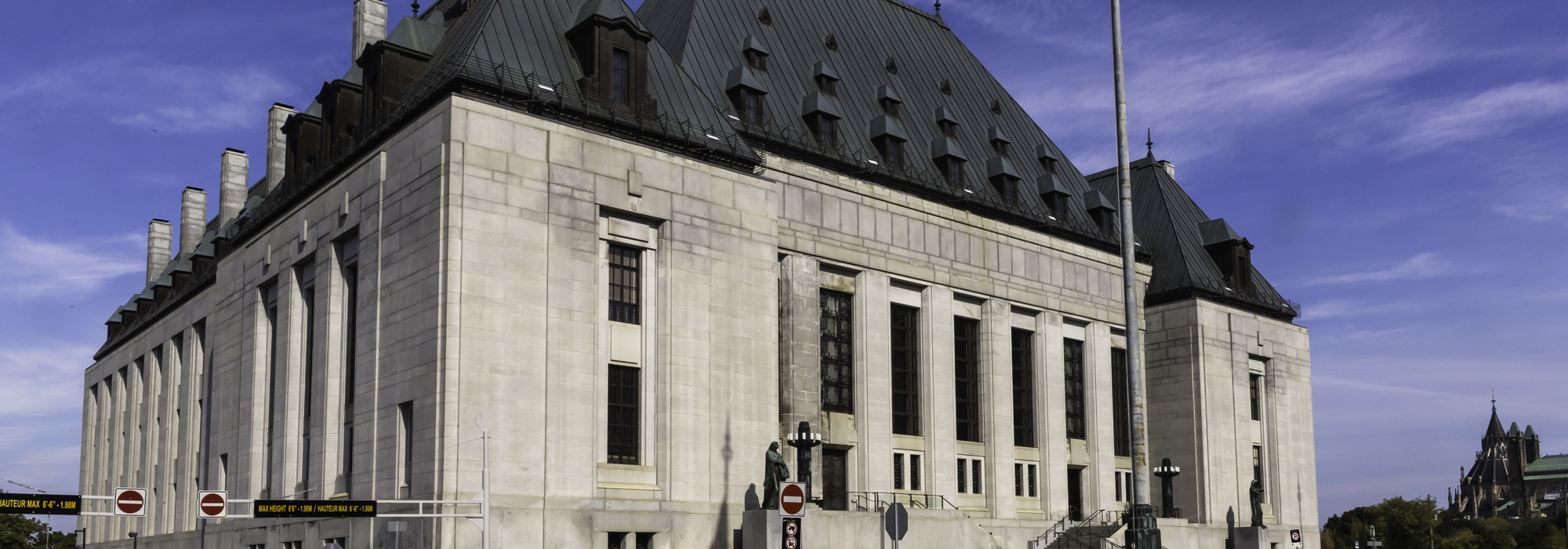
His government appointed hundreds of judges, including eight to the Supreme Court. It required new appointees to the Supreme Court to submit to televised questioning by a parliamentary committee. It clashed with the Chief Justice of Canada, going so far as to question her impartiality. It outsourced the creation of a short list of candidates to fill a vacancy on the Supreme Court to a provincial government. There were so many occasions on which Stephen Harper could have transformed Canada’s judiciary.
So many occasions — but transformation did not come. The judges his government appointed have been ruling in much the same way as those appointed by its predecessors might have. The hearings have been abandoned. The Supreme Court’s standing remains undiminished. The provincial participation in the Supreme Court appointment process was a one-off.
There have been some highlights along the way, to be sure: a few high-profile appointments that another party’s government would not have made, including most recently that of Justice Russell Brown to the Supreme Court; and even some victories in the Supreme Court of late, on the destruction of the gun registry data and on another judicial appointment, that of Justice Robert Mainville to the Quebec Court of Appeal.
But on the whole, if, on October 20, Harper finds himself a memoirist rather than prime minister, he will have no happy stories to tell about the least malleable branch of government. Indeed, there is little reason to believe that things will be otherwise if Harper’s memoir-writing days do not start so soon.
And yet his relationship with the courts has provoked plenty of sharp criticism and arguably even fear-mongering. Some of it, notably in response to the government’s attacks on the Chief Justice, was justified. But much, including the gloomy narrative of an alleged transformation of the judiciary that Sean Fine has been promoting in his articles for the Globe and Mail, seems like an absurd exaggeration when one considers just how little Canadian courts have actually changed in the last 10 years.
Both Harper and his critics, I believe, have made the same mistakes. They hold unrealistic views about the role of ideology in adjudication and, as a result, fail to appreciate the extent to which the judiciary is impervious to attempts at revolutionary transformation. Judges’ ideology matters, to be sure, but judicial ideology is not the same thing as partisan ideology. Especially in Canada, judges’ ideological influences and leanings do not lend themselves to simplistic classifications in terms of a liberal/conservative dichotomy. As a result, both the hopes and the fears that the power of judicial appointment can be used to radically change the courts are misplaced.
Claims that Canadian judges are generally free from ideological influences (in contrast, it is usually either said or implied, to their American colleagues) are naive. Consider just one example: the Supreme Court’s consistent opposition to modifications of the constitutional balance between Parliament and the provinces by one of the partners in the federation acting on its own. This opposition led the Court to oppose Pierre Trudeau’s plans for Senate reform and unilateral patriation of the Constitution, Quebec’s claims to be entitled to secede without negotiating terms with the rest of Canada and, more recently, Harper’s plans for a federal securities regulator and Senate reform. All these decisions reflect a certain vision of federalism ― which is, of course, an ideology, in the sense of a set of ideas about how society and its political institutions ought to be organized. The fact that an overwhelming majority of judges share these ideas should not prevent us from recognizing that they are not natural or self-evident, and that these cases could all have been decided differently.
However, the ideology underlying these decisions is not that of a political party or movement. It is not “liberal” or “conservative,” whether small-l and small-c or capital-L and capital-C. The same is true of other elements of Canadian judges’ ideological outlook. And this is indeed a real difference with the situation in the United States, where the ideologies prevalent among judges are in much closer ― although by no means perfect ― alignment with those of the major political parties.
The reason for that difference is not that partisanship or ideology have never played a role in judicial appointments in Canada. In fact, they always did. Many Canadian judges have had close political connections ― though that has not stopped them from being great judges, and from occasionally stepping on the toes of their former political friends. An excellent example of both these tendencies was Justice Jean Beetz, Pierre Trudeau’s erstwhile colleague and then legal adviser, who, as a judge, was one of the driving forces behind the Supreme Court’s opinion that stopped Trudeau’s unilateral patriation in its tracks.
And even apart from personal connections, Canadian governments have always appointed judges whose ideological leanings were at least not uncomfortable. Harper, contrary to what some of his critics would have us believe, did not start this trend. Ask yourself, for instance, how many separatists there have been among the federally appointed judges in or from Quebec, not just under Harper but under his predecessors, too. That said, Canadian politicians’ interest in judges’ ideology has mostly been pretty narrow. They did not appoint separatist judges ― or Marxist ones, or other obvious outliers ― but they seldom seem to have cared about the legal aspects of their appointees’ thinking. There have been some exceptions — Trudeau’s appointment of Bora Laskin comes to mind — but probably not that many.
Contrary to the apprehensions of his critics, Harper cannot have left any deep, lasting impression on the Canadian judiciary.
It may be that things have started to change over the course of Harper’s time as prime minister. It seems that he is now more concerned about appointing judges who will be more inclined to defer to Parliament, which is a matter of more specifically legal ideology. But deference by itself is not very much, especially in the face of section 52(1) of the Constitution Act, 1982, which provides that “any law that is inconsistent with the provisions of the Constitution is, to the extent of the inconsistency, of no force or effect.” It hardly amounts to an ideology, much less to a vision of constitutional law that might conquer the hearts and minds of Canadian lawyers for decades to come.
As the maxim goes, it takes a theory to beat a theory. The theory, or the ideology, that is dominant in the Canadian legal community now is not particularly coherent or well-developed, but we know, roughly, what it is. One of its key tenets is that the Constitution is a “living tree,” grown and tended to by courts, which have or can legitimately claim whatever powers and prerogatives are necessary to perform this task. Contrary to what many of this theory’s adherents — including Harper’s most strident critics — believe, it is not the only one conceivable in a democratic polity committed to the rule of law. But it is the one we have now ― and the one we will stick to in the absence of an alternative that is at least as well, or preferably better, articulated.
Such a theory, or a theory of any sort, other than incantations about “respect for Parliament’s will,” is conspicuously absent from any of the Harper government’s statements on the judiciary or its relationship with the courts. And even having a theory would not have been enough. Scientific theories, German physicist Max Planck said, prevails not because their opponents are persuaded of their correctness but because the opponents die eventually ― and are replaced by people who have grown up with new ideas. The law is not very different. It takes time, and a good deal of work, before today’s young heretics become the day after tomorrow’s aging guardians of orthodoxy ― and take up their seats on the bench.
The conservative movement in the United States worked hard at articulating its ideas about the US Constitution, the role of the judiciary and indeed all manner of other legal issues. Republican administrations, especially that of Ronald Reagan, have been involved in these efforts. Nothing of the sort has happened in Canada during Harper’s time as prime minister, and by now it is difficult to believe that another term would change anything. To be sure, there is arguably a precedent of sorts for such a spectacular reversal: Pierre Trudeau himself, most of whose constitutional legacy was the product of a term that started almost a dozen years after he first became prime minister. But if Trudeau succeeded late, he had tried before, early and often. As for Harper, it would not be quite correct to say that he and his government have so far failed to articulate a constitutional theory that could compete with that to which most Canadian lawyers subscribe, or to promote the careers of people who could have made this theory mainstream. I do not believe they even tried.
For this reason, contrary to the apprehensions of his critics, Harper cannot have left any deep, lasting impression on the Canadian judiciary. Sure, he has appointed a few judges who do not share the dominant ideology and who might try to push back against some of its excesses. But what are 2 judges among 40 on an appellate court, or 1 judge among 9 on the Supreme Court of Canada? Appellate judging is a collective endeavour. A judge’s views become law only if he or she succeeds at persuading colleagues to endorse them. The numbers are not there for this to happen with Harper’s appointees now. And the hard work ― both intellectual and organizational ― that might have ensured that the numbers would be there at some point in the future has not been done.
Whether this is a good or a bad thing, I do not know. Ideological homogeneity has both benefits and drawbacks. It makes the judiciary look less political; it allows courts to speak with one voice when they confront the elected officials, as they must do at least sometimes on any plausible view of their role in a constitutional democracy. But it also allows dubious ideas to go unchallenged and fuel a judicial arrogance that is ultimately going to harm both the courts’ standing and our democracy.
In any case, for good or ill, homogeneity is bound to prevail on our courts for decades to come. Stephen Harper may have had the opportunity to transform the courts, but he did not use it.







